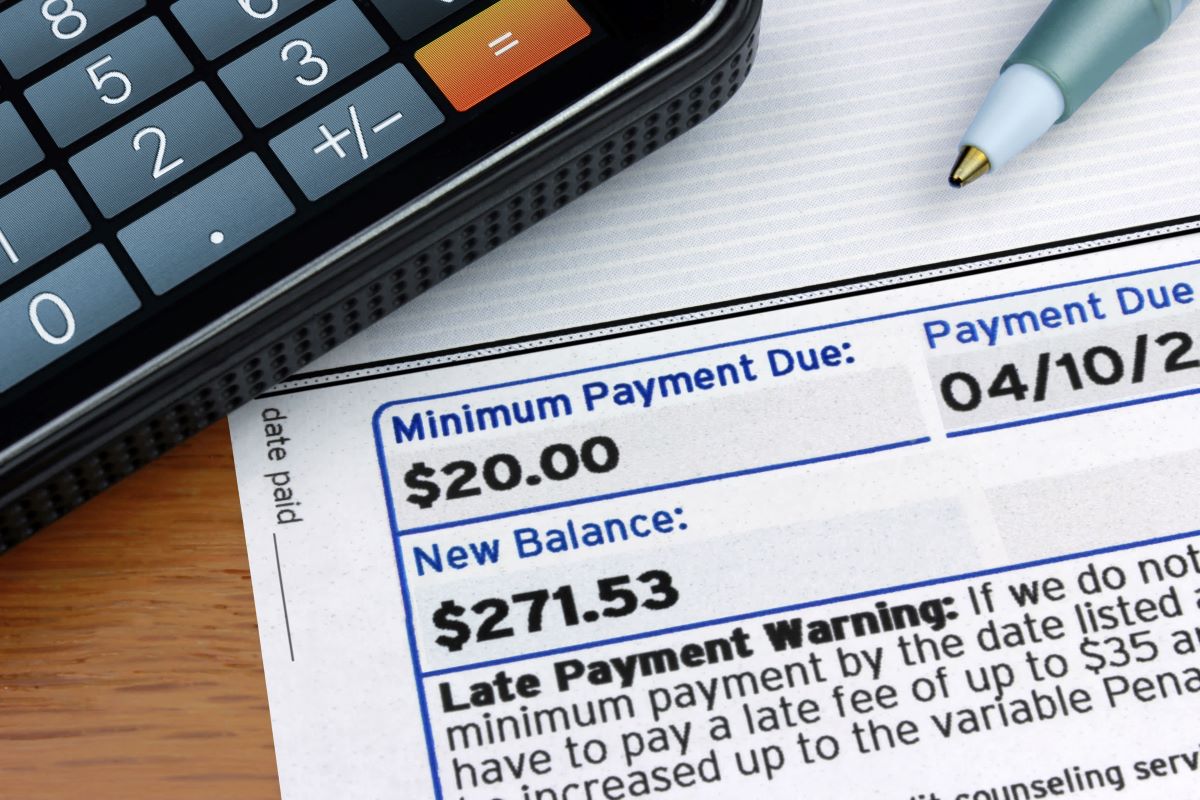Home>Finance>How Long Do Collection Agencies Have To Collect A Credit Card Debt In California?


Finance
How Long Do Collection Agencies Have To Collect A Credit Card Debt In California?
Modified: December 29, 2023
Find out the time limit for collection agencies to recover credit card debt in California. Stay informed about finance and debt collection laws.
(Many of the links in this article redirect to a specific reviewed product. Your purchase of these products through affiliate links helps to generate commission for LiveWell, at no extra cost. Learn more)
Table of Contents
- Introduction
- Understanding Credit Card Debt Collection in California
- California Statute of Limitations on Debt Collection
- Assessing the Statute of Limitations on Credit Card Debt Collection
- Exceptions to the Statute of Limitations on Credit Card Debt Collection
- Consequences of Ignoring or Paying Off Credit Card Debts
- Conclusion
Introduction
Dealing with credit card debt can be a stressful and overwhelming experience. Whether you’re struggling to make payments or have fallen behind on your credit card bills, it’s essential to understand the debt collection process. Each state has its own set of laws and regulations regarding how long collection agencies can pursue payment for outstanding debts.
In the state of California, the timeline for debt collection on credit card debts is governed by the California Statute of Limitations. This statute defines the maximum period during which a creditor or collection agency can legally take legal action to collect a debt. Understanding these time constraints is crucial to protect your rights and make informed decisions about how to handle your credit card debt.
In this article, we will delve into the specific rules for credit card debt collection in California and shed light on the statute of limitations. By gaining a comprehensive understanding of the timeframe involved in debt collection, you will be better equipped to navigate the process and make informed decisions to manage your financial obligations.
Let’s explore the intricacies of credit card debt collection in California and gain insights into how long collection agencies have to collect a credit card debt.
Understanding Credit Card Debt Collection in California
When it comes to credit card debt collection in California, it’s essential to have a solid understanding of the process. Credit card debt collection typically starts when a consumer defaults on their credit card payments. At this point, the creditor may attempt to collect the debt in-house or may hire a third-party collection agency to pursue payment on their behalf.
Collection agencies are companies that specialize in recovering unpaid debts on behalf of creditors. These agencies use various tactics to collect outstanding payments, including phone calls, letters, and even legal action in some cases. It’s important to note that collection agencies must adhere to certain laws and regulations governing their conduct in order to protect consumers from harassment or unfair practices.
In California, the key law that governs debt collection is the Fair Debt Collection Practices Act (FDCPA). This federal law sets guidelines for how collection agencies can communicate with debtors and prohibits certain abusive or deceptive practices. Under the FDCPA, collection agencies are not allowed to engage in activities such as making threats, using obscene language, contacting debtors at inconvenient times, or misrepresenting the amount owed.
It’s crucial to be aware of your rights as a consumer and familiarize yourself with the protections provided by the FDCPA. If you believe that a collection agency is violating your rights, you can file a complaint with the California Attorney General’s Office or consult with an attorney experienced in debt collection issues.
When dealing with credit card debt collection in California, it’s also important to keep accurate records of all communication and transactions related to the debt. This includes collecting and saving any letters, emails, or voicemails received from collection agencies, as well as maintaining a log of any phone calls or conversations.
By understanding the debt collection process and your rights as a consumer, you can navigate the credit card debt collection process more effectively and make informed decisions about how to handle your outstanding debts.
California Statute of Limitations on Debt Collection
In California, the statute of limitations determines the maximum period of time that a creditor or collection agency has to file a lawsuit to collect a debt. The statute of limitations varies depending on the type of debt, and it is crucial to understand these time frames to protect yourself from potential legal actions.
For credit card debt, the statute of limitations in California is generally four years. This means that after four years from the date of default on the credit card payments, the creditor or collection agency can no longer sue you for the debt in court.
It’s important to note that the clock for the statute of limitations starts ticking from the date of your last payment or last activity on the credit card account. So, if you made a payment or had any activity on the account after defaulting, the statute of limitations may be reset, and the clock starts from that date.
It’s worth mentioning that the statute of limitations does not erase the debt or prevent collection agencies from attempting to collect it. However, it limits their ability to take legal action to enforce the debt. They can still contact you, send collection letters, and try to negotiate a payment arrangement.
It’s crucial to be aware of the statute of limitations on credit card debt in California as it can impact your decision-making process when dealing with collection agencies. Once the statute of limitations has expired, you have a legal defense against any potential lawsuits brought by the creditor or collection agency for that particular debt.
However, it’s essential to exercise caution when interacting with collection agencies and not to take any actions that could potentially restart the statute of limitations. For example, making a payment or acknowledging the debt, even in writing, could reset the clock on the statute of limitations.
If you’re unsure about the expiration of the statute of limitations on your credit card debt, it’s advisable to consult with an attorney who specializes in debt collection laws. They can provide you with guidance on the specific details of your situation and help you make informed decisions.
Understanding the California statute of limitations on debt collection is crucial for managing your credit card debts, protecting your rights, and making informed decisions about how to handle collection attempts.
Assessing the Statute of Limitations on Credit Card Debt Collection
Assessing the statute of limitations on credit card debt collection is an important step in managing your financial obligations and protecting your rights as a consumer in California. Understanding the timeframe involved can help you make informed decisions about how to handle collection attempts and negotiate with creditors or collection agencies.
To assess the statute of limitations on your credit card debt, you need to determine the date of your last payment or activity on the account. This is the starting point for calculating the four-year period during which a creditor or collection agency can sue you to collect the debt.
If the statute of limitations has expired, it means that the creditor or collection agency can no longer file a lawsuit against you to enforce the debt. However, it’s important to note that the debt itself doesn’t disappear, and collection agencies can continue to contact you to attempt to collect the outstanding balance.
When assessing the statute of limitations, be cautious about restarting the clock. Any payment made or acknowledgement of the debt, even in writing, can potentially reset the statute of limitations and give the creditor or collection agency the ability to take legal action.
It’s also important to keep in mind that the statute of limitations can vary depending on the specific circumstances. In some cases, it is possible for the statute of limitations to be tolled, or paused, which could extend the timeframe for debt collection. This can occur if you leave the state or if the creditor obtains a judgment against you.
If you believe that the statute of limitations has expired on your credit card debt, it’s advisable to consult with an attorney who specializes in debt collection laws. They can review your specific situation and provide guidance on the best course of action.
Additionally, it’s crucial to be aware that even if the statute of limitations has expired, the debt can still appear on your credit report and negatively impact your credit score. Therefore, it’s important to consider all the aspects of your financial situation when weighing your options and deciding how to address the debt.
Assessing the statute of limitations on credit card debt collection is an important step in understanding your rights and determining the best approach to managing your outstanding debts. By being informed and seeking professional advice when necessary, you can navigate the debt collection process more effectively and make decisions that align with your financial goals.
Exceptions to the Statute of Limitations on Credit Card Debt Collection
While the statute of limitations sets a general timeline for credit card debt collection in California, there are certain exceptions that can affect the ability of creditors or collection agencies to pursue legal action after the expiration of the statute of limitations.
One common exception is the concept of “revival” or “re-aging” of the debt. This can occur when a debtor makes a payment or acknowledges the debt, even in writing, after the statute of limitations has expired. In such cases, the clock on the statute of limitations may reset, and creditors or collection agencies gain a new opportunity to pursue legal action.
Another exception involves certain types of legal actions that can toll, or pause, the statute of limitations. For example, if a creditor obtains a judgment against you, the statute of limitations may be tolled, allowing them to enforce the debt for a longer period. Additionally, if you leave the state of California, the statute of limitations may also be tolled until you return.
It’s crucial to be aware of these exceptions and understand how they can impact the statute of limitations on your credit card debt. It’s advisable to consult with a legal professional who specializes in debt collection laws to review your specific situation and provide guidance on the applicable exceptions.
It’s also important to note that the statute of limitations and its exceptions only apply to the ability of creditors or collection agencies to sue to collect the debt. The debt itself does not go away, and collection agencies can continue to attempt to collect the outstanding balance through other means, such as phone calls or letters.
When dealing with collection attempts, it’s important to communicate and negotiate with collection agencies in a proactive and assertive manner. Keep clear records of any interactions and ensure that all agreements are documented in writing. This can help protect your rights and ensure that you are not inadvertently resetting the statute of limitations by making a payment or acknowledging the debt.
Understanding the exceptions to the statute of limitations on credit card debt collection is crucial to managing your financial obligations effectively. By being aware of these exceptions and seeking professional advice when necessary, you can make informed decisions and protect yourself from potential legal actions.
Consequences of Ignoring or Paying Off Credit Card Debts
Ignoring or neglecting your credit card debts can have serious consequences that can impact your financial well-being and creditworthiness. It’s important to understand the potential outcomes of ignoring or paying off credit card debts to make informed decisions about how to manage your financial obligations.
1. Credit Score Impact: Ignoring or defaulting on your credit card debts can significantly damage your credit score. Late payments, defaults, or charge-offs can remain on your credit report for up to seven years, making it challenging to obtain future credit or secure favorable interest rates. It’s important to maintain a good payment history and address your credit card debts promptly to protect your credit score.
2. Collection Actions: Ignoring your credit card debts can lead to aggressive collection actions by creditors or collection agencies. This can include constant phone calls, letters, and legal action, such as lawsuits or wage garnishments. Collection actions can cause stress and disrupt your financial stability. It’s essential to engage with creditors or collection agencies and explore options for repayment or negotiation.
3. Financial Consequences: Unpaid credit card debts can accumulate late fees, penalties, and high-interest charges, further exacerbating your financial situation. These additional costs can make it even more challenging to pay off the debt. It’s crucial to address your credit card debts promptly to mitigate these financial consequences.
4. Legal Ramifications: Ignoring credit card debts can lead to legal repercussions. If a creditor or collection agency files a lawsuit against you and obtains a judgment, they may have the right to garnish your wages or place liens on your property. This can have severe financial implications and make it difficult to maintain your financial stability. It’s important to address any legal actions promptly and seek legal advice if necessary.
5. Stress and Emotional Impact: The burden of unpaid credit card debts can take a toll on your mental and emotional well-being. Constant harassment from collection agencies, the fear of legal action, and the financial strain can cause significant stress and anxiety. It’s important to take proactive steps to address your debts and seek support from financial professionals or credit counseling services.
Paying off your credit card debts, on the other hand, has its own set of consequences. While it helps you eliminate the debt and improve your credit score over time, it can also deplete your savings and limit your financial flexibility. It’s important to consider your overall financial situation and create a repayment plan that aligns with your goals and priorities.
Ultimately, whether you choose to ignore or pay off your credit card debts, it’s important to weigh the potential consequences and make an informed decision. Seeking professional advice or guidance can be instrumental in finding the best approach to manage your debt responsibly and regain your financial stability.
Conclusion
Navigating credit card debt collection in California requires a thorough understanding of the state’s laws and regulations. By familiarizing yourself with the California Statute of Limitations and the exceptions that may apply, you can protect your rights and make informed decisions about handling your credit card debts.
Remember that the statute of limitations sets the maximum period that creditors or collection agencies have to file a lawsuit to collect a debt. It’s crucial to be aware of the date of your last payment or activity on the account as it determines when the statute of limitations starts ticking.
While the statute of limitations provides some protection against legal action, it’s important to note that it does not erase the debt itself. Collection agencies can continue to contact you to collect the outstanding balance. Additionally, certain actions, such as making a payment or acknowledging the debt, can reset or toll the statute of limitations.
Ignoring credit card debts can have serious consequences, including damaging your credit score, aggressive collection actions, financial penalties, and potential legal repercussions. It’s essential to address your credit card debts promptly and consider options such as negotiation or repayment plans to mitigate these consequences.
Paying off your credit card debts can help you eliminate the debt and improve your credit score over time. However, it’s important to consider the potential financial implications and create a repayment plan that aligns with your overall financial situation and goals.
In conclusion, understanding the statute of limitations on credit card debt collection in California is crucial for managing your financial obligations effectively. By being informed, proactive, and seeking professional advice when necessary, you can navigate the debt collection process and work towards regaining your financial stability.
Remember, you have rights as a consumer, and it’s important to educate yourself about the debt collection laws that protect you. By taking charge of your financial situation and addressing your credit card debts responsibly, you can work towards a brighter financial future.














